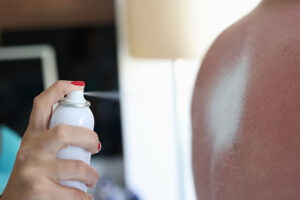New report questions aerosol sunscreens’ effectiveness and safety

The 2025 edition of the Environmental Working Group (EWG) Sunscreen Guide evaluated over 2,200 sun care products and found that fewer than one in four met the group’s standards for safety and efficacy.
Among the most scrutinised were aerosol spray sunscreens, which now make up more than a quarter of all SPF-labelled products.
According to the EWG, spray sunscreens continue to present potential health risks due to inhalation concerns, inconsistent coverage and the use of controversial ingredients.
While the US Food and Drug Administration (FDA) proposed new aerosol testing requirements in 2019, those changes have yet to be implemented.
This lag leaves spray formulations without updated safety benchmarks.
Inhalation of fine mist during application remains a prominent concern, particularly for children.
The report also draws attention to the continued presence of fragrances containing allergens, hormone disruptors, or possible carcinogens in 36% of SPF products reviewed.
Notably, many of these ingredients are still not required to be disclosed on product labels, particularly in the US.
The EWG recommends that consumers and commercial buyers prioritise fragrance-free formulations or products verified for transparency and safety through independent certification schemes.
Though a US federal law passed in 2022 requires clearer labelling of fragrance allergens in sunscreens by mid-2024, delays in regulatory follow-through have left a gap in consumer protection.
Aerosol SPF products have also seen a shift away from certain ingredients following widespread criticism and environmental scrutiny. The use of oxybenzone, once found in 70% of non-mineral sunscreens in 2016, has dropped to 9%. This comes amid concerns about its hormonal effects and its impact on marine life.
Similarly, Vitamin A derivatives like retinyl palmitate have largely been phased out, with only 2% of products still containing them - down from 41% in 2010 - due to evidence suggesting they may increase skin damage when exposed to sunlight.
For businesses involved in the development or sale of SPF products, the report reinforces the importance of updating formulations, enhancing ingredient transparency, and preparing for evolving regulatory expectations, particularly in aerosol delivery systems.











